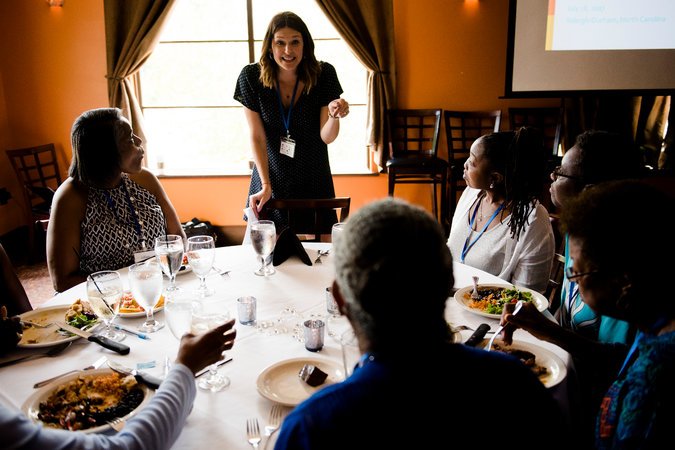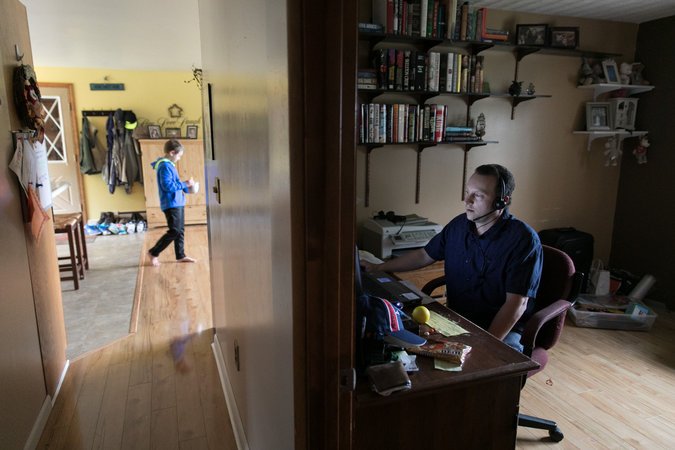While critics of the arrangement cite rising insecurity, some of Liveops’ star agents — like Emmett Jones in Chicago, who knows of his rivals primarily as numbers on a leader board — say the opportunity has been transformative.
Interactive Feature
How Uber Uses Psychological Tricks to Push Its Drivers’ Buttons
The start-up has undertaken an extraordinary experiment in behavioral science to subtly entice an independent work force to maximize company revenue.

The earnest gratitude of the agents assembled here, not far from the Raleigh-Durham Airport, affirmed that. To them, Liveops is a sustaining force, a way to earn a living while being present at home. A few had driven hours to attend. Many brought friends and family members who were considering joining “Liveops Nation,” too.
There were icebreakers (“Liveops Nation Bingo”). Gift-card raffles (“$150?” the chief executive quipped. “Who approved these things?”). Free enchiladas. Everyone was invited to schmooze.
Advertisement
Continue reading the main story
“John, I heard your story about how you got to us is pretty great,” said the master of ceremonies, an impossibly sunny woman named Tara. “Would you mind telling all these people?”
When the mic came to John, a former insurance claims adjuster with a gray beard and several earrings, there was a sense of imminent revelation.
“I was working in another glass box over near here for six years,” he began. “I reached the point where it was either jump off the roof or walk out the front door.” The other agents laughed knowingly.
He continued: “My commute now is I walk down the hall, close the bedroom door behind me.” More laughter.
Then John’s voice softened: “This is good, this is good. I get paid for when I’m working, instead of souring when you get paid for 40 hours and work some more. So, I’m here.”
“Awesome,” Tara said, applause drowning her out. “I feel like John’s story mimics a lot of what we hear from people.”
According to Greg Hanover, a longtime Liveops official who became chief executive this summer, the company’s goal is to make agents feel as if they’re part of a movement, not just earning a wage.
“Where we want to be with this is what Mary Kay has done, multilevel marketing companies,” Mr. Hanover said, referring to the cosmetics distributor and its independent sales force. “The direction we need to head in for the community within Liveops Nation is that the agents are so happy, so satisfied with the purpose and meaning there, that they’re telling their story.”

It’s an ambition that feels almost radical compared with Uber, whose best-known exercise in worker outreach is a video of its former chief executive berating a driver. It was heartening to discover that on-demand work could be both financially viable and emotionally fulfilling.
Advertisement
Continue reading the main story
That is, until I began to speak with Mr. Jones and some of his Liveops competitors. The more you talk with them, the more you detect a kind of Darwinian struggle behind the facade of community and self-actualization. You start to wonder: Is there really such a thing as a righteous gig-economy job, even if the company is as apparently well intentioned as Liveops? Or is there something about the nature of gig work that’s inescapably dehumanizing?
Just the Right Tone
Mr. Jones, who lives in Chicago, was the top rated Liveops agent for an insurer called TruStage for much of this year.
An ATT technician for decades, he decided that he needed to be at home not long after his wife was diagnosed with vertigo in 2008. “I can’t work and be worried about how she’s doing,” he said.
A few years later, when his daughter told him of a friend who worked with Liveops, he was eager to sign up — but refused to send in his required voice test until it was close to perfect. “I must have did the voice test four or five times,” he said. “I wanted to make sure I gave the right tone that they were looking for.”
As a Liveops agent, Mr. Jones sells life policies to callers, often those who have just seen a television commercial for TruStage insurance. He estimates that he works roughly 40 hours each week, beginning around 8 most mornings, and that he makes about $20 an hour. He is such a valued worker that TruStage invited him to its headquarters earlier this year for a two-day visit by an elite group of agents, in which executives pumped them insights about how to increase sales.
Roughly two decades ago, Liveops and its competitors typically connected callers to psychic hotlines, and in some cases less reputable services. Such businesses had frequent spikes in call volume, making it helpful to have an on-demand work force that could be abruptly ramped up.
“The only thing people were interested in was the abandonment rate” — that is, the number of people who would hang up in frustration from being kept on hold — said Kim Houlne, the chief executive of a Liveops rival called Working Solutions, which she founded in 1996.
Advertisement
Continue reading the main story
The call center industry took a hit during the 2001 recession, when cost consciousness unleashed a wave of outsourcing to India. But within 10 years, many companies decided that the practice, known as offshoring, had been oversold. The savings on wages were often wiped out by lost business from enraged customers, who preferred to communicate with native English speakers.
“People don’t feel comfortable,” Ms. Houlne said, alluding to the overseas agents.
By the early part of this decade, quality was in fashion. The enormous amounts of data that companies like Liveops and Working Solutions collect allowed them to connect callers to the best possible agent with remarkable precision, while allowing big clients to avoid the overhead of a physical call center and full-time workers.
Today, in addition to sales calls, Liveops agents handle calls from people trying to file insurance claims, those in need of roadside assistance, even those with medical or financial issues relating to prescription drugs. The agents must obtain a certification before they can handle such calls, which sometimes takes weeks of online coursework.
Liveops goes to great lengths to attend to their needs, addressing technical-support issues, even answering agents’ emails to the chief executive within 24 hours.
Mr. Jones, like many of his fellow agents, thinks of himself as helping others in need. He said that many families will gather around a table after a loved one has died to discuss the burial. If the deceased relative had no insurance, he said, “A lot of times that table is going to clear.” If, on the other hand, he had even $2,000 in life insurance — the minimum that TruStage sells — “the family members are more inclined to say, ‘He did what he could, let me see what I could do to help out.’ You end up with $5,000 to $6,000. You can do a decent burial rather than none at all.”
Still, there is undeniably a brass-tacks quality to the work. Shortly after we hung up, I turned my attention to an assignment due that afternoon, only to receive more calls from Mr. Jones’s number. When I finally answered, he apologized for interrupting me, then came to the point. “I have a question for you,” he said. “Do you have life insurance?”
Newsletter Sign Up
Continue reading the main story
Thank you for subscribing.
An error has occurred. Please try again later.
You are already subscribed to this email.
‘Where the Price Point Is’
Like Uber, Liveops expends considerable effort calculating demand for its agents. For example, if an auto insurance company is running a commercial on ESPN, Liveops will ask the company’s media buyer — that is, the intermediary that placed the ad — to predict how many calls such an ad is likely to generate. Liveops will adjust that prediction, using its own data showing how many calls similar ads have produced from similar audiences during a comparable time of year.
And like Uber, the Liveops focuses on “utilization” — in the Liveops case, the percentage of working agents actually on a call. Depending on the client, Liveops strives for rates of 65 percent to 75 percent. Lower than that and the agents, who make money only when they’re on a call, will complain that they’re not busy enough. Significantly higher and the system is vulnerable to a sudden increase in demand could that tie up the phone lines and keep callers waiting.
Liveops asks agents to schedule themselves in half-hour blocks, known as “commits,” for the upcoming week. If the company expects demand to be higher than the number of commits, it sends agents a message urging them to sign up. (Uber does something similar, except without formal scheduling.) Sometimes it will even offer financial incentives, like a bump in the rate earned for each minute they’re on a call, or a raffle-type scheme in which people accumulate tickets for the giveaway of an iPad or a cruise.
Advertisement
Continue reading the main story
Again like Uber, Liveops relentlessly tests the effectiveness of these tools. Referring to financial incentives, Jon Brown, the Liveops senior director of client services, said, “We’ve zeroed in on exactly what we need for an agent to go from 10 to 15 commits, from 15 commits to 20 commits. We know where the price point is, what drives behavior.”
And then there are the performance metrics. Liveops agents are rated according to what are called key performance indicators, which, depending on the customer, can include the number of sales they make, their success at upselling customers, and whether a caller would recommend the service based on their interaction.
Liveops makes clear that its agents’ ability to earn more money is closely tied to performance. “You’ve heard the term meritocracy?” said a Liveops official named Aimee Matolka at the North Carolina event. “When a call comes in, it routes in to that best agent. Yes, our router is that smart. You guys want to be that agent, I know you do. Otherwise you wouldn’t be here.”
It allows the agents to track their rankings obsessively through internal leader boards. (Liveops officials say that while the pressures of the job can preoccupy agents, it is up to them how much time to invest.)
“I lost the No. 1 spot, now I’m No. 2,” Mr. Jones said in early August, acknowledging that he checks his ranking frequently. “I thought about researching to find out who it is — you always want to know who’s the competition — but I said leave it.”
He added: “I’m a competitive person. We just toggle back and forth. If they see me jump back in, they work harder. They want that spot back.”
‘This Is My Phone Call’
My flight to Bangor, Me., was due after 9 p.m., and apparently sensing my unease with the North Country, the firefighter seated next to me asked if I had to far to drive when we landed. “About three hours north,” I confessed. “Watch out for moose,” he said. I assured him I’d driven around deer before. He stopped me short: If you hit a deer, you’ll kill them, he said. If you hit a moose, they’ll kill you.
I found Troy Carter, the agent who had recently surpassed Emmett Jones, at his home in Fort Fairfield the next day, wearing jeans, a button-down short-sleeve shirt, and a New England Patriots hat. There were no shoes on his feet, only white socks.
Advertisement
Continue reading the main story
Like Mr. Jones, Mr. Carter said Liveops had been a blessing, allowing him to earn a living in a part of Maine so remote that my cellphone carrier welcomed me to Canada shortly after I pulled into his driveway.
When I told Mr. Carter that I had been in touch with his top competitor, he quickly pulled up the latest monthly rankings of Liveops agents selling TruStage insurance. He pointed out that while Mr. Jones, whom he recognized only by his identification number, 141806, had more sales — 87 to his 82 — he had far fewer paid sales, charged at the time of purchase rather than by invoice.
“The real thing is the paid application rate — they want it around 95 percent,” Mr. Carter said. “He has 87 sales, but only 65 percent paid, compared to my 94 percent.” This, he explained, was why he enjoyed the right to call himself the top agent for the month.
Mr. Carter is what you might call a serial entrepreneur. He once started an art supply website that folded within a few months, and a penny auction site called Bid Tree that foundered for lack of a marketing budget.
He sees Liveops, on which he spends 40 to 50 hours per week, as of a piece with these entrepreneurial efforts. In fact, it is something of a family business. His wife, Lori, handles incoming calls while he’s busy with customers. “I’m a housewife/secretary/receptionist,” she said. Even Mr. Carter’s 9-year-old son, Logan, plays a role. “At nighttime, he says the last part of his prayer based on how many sales I did today,” Mr. Carter said. “If it was a lot of sales, he’ll pray, ‘Dear Lord, help my dad get the same amount of sales tomorrow.’”
Though Liveops agents work from a script, Mr. Carter, like Mr. Jones, adds his own flourishes. Before asking a caller’s gender, as he is required to do, he will say, “Now I already know the answer to this question, but please confirm if you’re male or female.” Upon receiving the answer, he will pause momentarily before saying, “I told you I already knew the answer,” and break into a laugh.
He might make this identical joke, with identical timing, dozens of times in a workday. “It’s like a comedian has a little pause before a joke,” he told me. “It relaxes them right off.”
Even with these touches, results can vary widely. Two days earlier, Mr. Carter had made seven sales, only a few shy of his record. The day I turned up, he managed only one. He said some callers had the impression they could receive $25,000 of insurance for $9.95 per month — the commercial mentions both figures — and begged off when Mr. Carter told them that their premiums would be substantially higher.

Mr. Carter has done research on how to comport himself, including watching an instructional YouTube video by the former stockbroker who was the subject of the movie “The Wolf of Wall Street.” He believes the key is to come off as the alpha presence. “The one that asks the most questions is the one in control,” he said. “If they ask me questions — ‘How are you doing?’ — I’ll come back, ‘The question is how are you doing?’ This is my phone call, as much as I can make it.”
Advertisement
Continue reading the main story
But on this day he repeatedly ran up against the limits of his powers. Even those who remained interested after 10 or 15 minutes of painstaking back-and-forth often demurred when Mr. Carter asked them for payment information. “This one guy was outside in a wheelchair,” Mr. Carter said of a caller who couldn’t produce his credit card. “He didn’t want to go in and get it. I said, ‘I’m fine waiting,’ but I can’t push him.”
These setbacks only seem to make Mr. Carter focus more. At one point, he made a swiping motion between his face and his headset with his index finger and middle finger. “They recommend that you keep the microphone two fingers away,” he said. “I’m always doing that — checking that it’s two fingers. I’ll do that for the rest of my life.”
It seemed, all in all, like a grueling way to make the slightly more than $30,000 that Mr. Carter estimates he takes in before taxes. “The good thing is he can take hours off,” Lori told me. “But then he can lose his spot. It’s always a fight for the top.”
I was reminded of the Alec Baldwin monologue from the movie “Glengarry Glen Ross,” except that the prize for having the most sales wouldn’t be a Cadillac, it would be a set of steak knives, because the Liveops analytics team had calculated that agents would give nearly as much effort for a prize worth a small fraction of the cost.
Of course, unlike the salesmen in that movie, the Liveops agents can’t really be fired — the third prize — because they weren’t employees to begin with.
A while later, Mr. Carter described a recent initiative in which agents were promised a bonus if 95 percent of their collective sales were paid up front. “I knew it wasn’t going to work as soon as they said it,” he told me, because a handful of agents with low paid rates could ruin everyone else’s chances.
“They did do a pullover sweatshirt for the top two,” he added, brightening. “I was second, so that’s coming.”
Continue reading the main story
Article source: https://www.nytimes.com/2017/11/11/business/economy/call-center-gig-workers.html?partner=rss&emc=rss
Speak Your Mind
You must be logged in to post a comment.